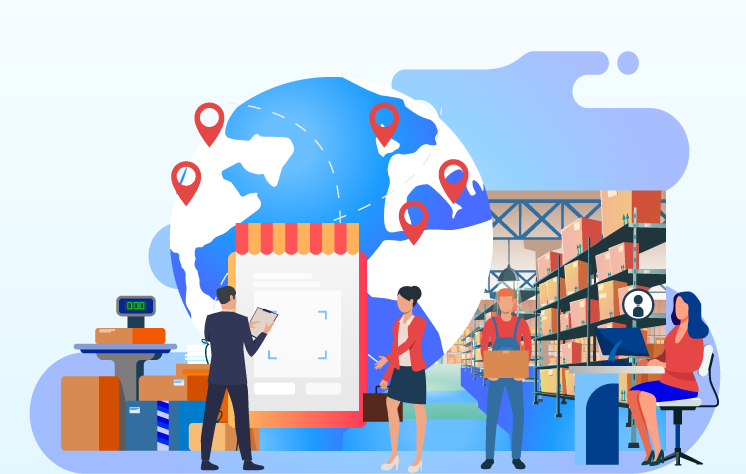Maximising Efficiency Through Smart Distribution and Consumer Management Software

{In our increasingly competitive business environment, companies are driven to enhance processes and real-time decision-making. The demand for a reliable and scalable distribution management system is at an all-time high. From handling multiple warehouses to real-time delivery oversight, an advanced distributor and consumer management system significantly refines operations and supports smarter decision-making.
Understanding Distribution Management Systems
A distribution management system serves as a software solution that manages distribution from suppliers to end-users. It integrates multiple functions like order tracking, inventory management, distributor coordination, billing, and logistics under one interface. With digitisation, tasks become seamless, and the system ensures accuracy and transparency.
This type of system is crucial in industries such as retail, pharmaceuticals, FMCG, and manufacturing. These industries demand timely and accurate reporting to stay competitive.
How Distributor and Consumer Management Adds Value
A robust distributor and consumer management system goes beyond stock tracking—it focuses on people. Multiple stakeholders depend on real-time data for smooth coordination. A unified interface ensures smoother transactions, better history tracking, and efficient communication.
Track metrics, reward engagement, and reduce disputes—all within a single platform. Consumer insights drive campaign targeting, delivery improvements, and better service quality.
Benefits of a Unified Management System for Distributors and Consumers
Working in silos leads to inefficiencies; integration solves that. A unified distributor and consumer management solution connects multiple business functions for faster coordination. It improves internal communication, shortens response times, and elevates stakeholder satisfaction.
Especially in multi-layered distribution structures, central control is vital. You can monitor inventory across branches, forecast needs, and automate replenishment from one dashboard.
Real-Time Resource and Crew Management
Today's platforms often include additional tools like crew scheduling and resource tracking to optimise team deployment. You can manage logistics schedules, assign staff, and avoid operational overlap.
For businesses that rely on field teams, tracking crew movement in real-time improves service quality and punctuality. Efficient crew scheduling eliminates overlaps and ensures all tasks are properly handled.
Leveraging a Scalable Database in Distribution
Every distribution management system needs a scalable database management system to manage growing data volumes. As businesses expand, data such as sales figures, product codes, routes, and payment logs multiply rapidly.
It enables efficient queries, data security, and audit-readiness. It supports advanced analytics, custom reports, and system-wide backup protocols.
Adding Training and Learning Modules to Your Software
Large distribution networks often require internal training, compliance checks, and onboarding tools. Here’s where tools like training management systems or school-style learning modules help.
Companies can schedule workshops, upload learning materials, monitor attendance, and evaluate performance from within the main software. It helps your teams stay updated on products, regulations, and best practices.
Common Challenges Solved by Smart Software
Manual processes cause errors, inefficiencies, and miscommunication. Inconsistent systems affect both bottom line and brand trust.
The right solution offers:
• Automated Workflows: Reduce data entry with full workflow automation
• Live Inventory Monitoring: Track inventory movements instantly to prevent stock gaps
• Geo-Mapped Logistics: Assign field agents and trucks based on live location data
• Instant Reporting: Data is available anytime for smarter decisions
• Distributor Scorecards: Track targets, timelines, and market coverage
The Rise of Automation in Distribution
The business world is leaving behind spreadsheets and disconnected CRMs for cloud-based tools. Mobility and cloud hosting ensure anytime, anywhere access.
In the digital age, your distribution must be responsive and transparent. Companies adopting digital models scale faster and remain competitive.
Long-Term Advantages of Modern Distribution Software
A feature-rich distribution management system delivers:
• Higher Efficiency: Automation eliminates bottlenecks and speeds up operations
• Better Customer Experience: On-time service and updates build customer trust
• Insight-Driven Strategy: Use data to make better decisions and forecasts
• Cost Reduction: Save costs by predicting demand and streamlining supply
• Compliance Ready: Built-in reporting ensures legal and tax compliance
Modular Features and API Integration Benefits
Tailored software ensures better adoption and outcomes. Look for solutions that allow module-level customisation, third-party API integrations, and mobile access.
ERP, accounting, CRM, or logistics platforms should sync effortlessly with resource management your new system. This ensures that your digital transformation is efficient and uninterrupted.
Summing Up the Need for Smart Distribution Management
Businesses can no longer operate efficiently without modern distribution software. Whether you're overseeing hundreds of partners or juggling multi-tier networks, software ensures clarity, speed, and profitability.
Today’s systems offer a 360-degree solution for growing distribution needs.
Now is the perfect time to adopt a smart distribution and consumer management tool. Success today starts with smarter tools and integrated platforms.